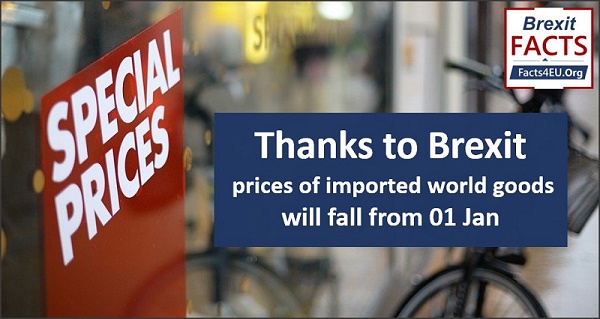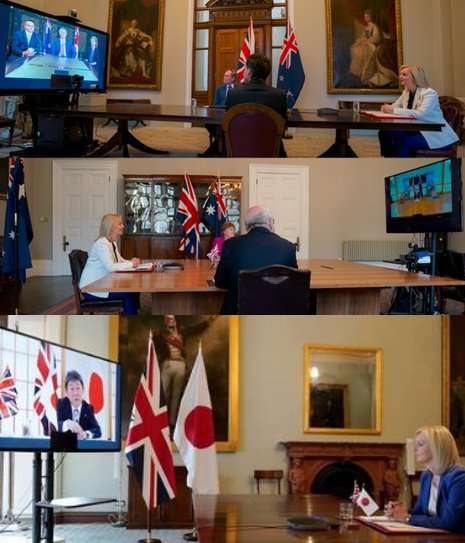Thanks to Brexit, prices of imported world goods will fall from 01 Jan
EU’s inflated import tariffs will go, replaced by simpler scheme designed to benefit the UK

© Brexit Facts4EU.Org 2020
Consumers can buy more cheaply, companies can source more competitively
From 1 January 2021 consumers and companies will benefit from lower tariffs on imported goods from around the world, as a result of the UK finally leaving the EU’s Customs Union.
Once the UK has left, it will apply a UK-specific tariff to imported goods from day one. This UK Global Tariff (UKGT) will replace the EU’s Common External Tariff which made many goods from around the world more expensive for UK consumers. In a great many cases the EU’s tariffs were there to protect producers in EU27 countries, and the UK had no choice but to apply them.
Brexit Facts4EU.Org Summary
Examples of products which will be tariff free, thanks to Brexit
- Dishwashers and freezers
- Sanitary products and tampons
- LED lamps, paints, screwdrivers, scissors, garden shears
- Cooking products such as baking powder, herbs, cocoa powder
- Even Christmas trees will be tariff free, a year next Christmas
New UK tariff regime simplifies and cuts costs
The new tariff is tailored to the needs of the UK economy and it will make it easier and cheaper for businesses to import goods from overseas. It is a simpler, easier to use, and lower tariff regime than the EU’s Common External Tariff and will be in pounds, not euros. It will scrap red tape and other unnecessary barriers to trade, reduce cost pressures and increase choice for consumers, as well as backing UK industries to compete on the global stage.
The UK’s new tariff schedule will streamline and simplify nearly 6,000 tariff lines, thereby lowering costs for businesses by reducing administrative burdens. The changes include scrapping unnecessary tariff variations, rounding tariffs down to standardised percentages, and getting rid of all “nuisance tariffs” (those below 2%).
The EU’s complex ‘Meursing table’ will go, allowing the UK to scrap over 13,000 unnecessary tariff variations on products such as biscuits, confectionery, pizzas, quiches, and spreads.
60% of import trade will be tariff free
The UKGT also expands tariff free trade by eliminating tariffs on a wide range of products. The UKGT aims to ensure that 60% of trade will come into the UK tariff free on WTO terms or through existing preferential access from January 2021, and successful FTA negotiations will increase this.
This will lower costs for businesses, ensuring they can compete on fair terms with the rest of the world, as well as keeping prices down and increasing choice for consumers.
International Trade Secretary Liz Truss said
“For the first time in 50 years we are able to set our own tariff regime that is tailored to the UK economy. Our new Global Tariff will benefit UK consumers and households by cutting red tape and reducing the cost of thousands of everyday products.
“With this straightforward approach, we are backing UK industry and helping businesses overcome the unprecedented economic challenges posed by Coronavirus.”
Observations
There is a common misconception that tariffs on goods entering the UK will somehow attract higher rates applied by the EU. This is of course not the case. It is the importing country (in this case the UK) which chooses what level of tariff to apply.
The UK Government has its new United Kingdom General Tariff which was the subject of much consultation with British business and consumer groups, and this has now been lodged with the WTO.
In the event of no Free Trade Agreement (FTA) between the UK and the EU, all goods entering the UK from the EU27 will be subject to these new tariffs, as will those from any other country around the world which does not have a specific FTA in place. Under WTO rules this is referred to (confusingly) as ‘Most Favoured Nation’ (MFN) status.
In many cases this will result in lower prices for products sourced from around the non-EU world.
What happens to products imported from the EU next year?
If the UK exits the EU on 31 December 2020 without a free trade agreement in place, then the UK’s new tariff regime will apply to all EU27 imports.
Instantly the Irish beef and dairy industry will be hit, as will many other industries in all other EU countries. Last year (2019) the EU sold €318.7 billion of products to the UK each year – that’s €124.9 billion more than the UK sold to the EU27. (EU Commission figures.)
Some of these imported products from the EU will now attract zero tariffs, as we have explained above. Some will now be subject to UK tariffs for the first time in nearly 50 years.
There will be a period of adjustment as consumers make their choices
Many confirmed Brexiteers have already started buying British in place of EU27 goods, on principle and as a result of the EU’s bullying attitude to the UK since 2016 when the majority of the electorate voted to leave.
When the UK general population is faced with the choice of similar products, one from the EU where a UK tariff has been applied, or a British product with no tariff affecting its price, we suspect that a process known as ‘substitution’ will kick in.
In many cases this will result in increased demand for British products – and for non-EU products which no longer have high EU tariffs applied – and the result will be a fall in sales for EU27 producers.
Will the UK leave on WTO terms?
No-one knows the final outcome of the UK-EU trade talks for certain. Our best guess currently is that a ‘fudge’ is being prepared. This will involve a compromise by the UK government on some of the EU’s outrageous demands. It will also mean that the disastrous Withdrawal Treaty will stay in place.
We continue to lobby for the following:-
- Repudiate the Withdrawal Treaty (including the Northern Ireland Protocol) on the grounds that the EU has acted in bad faith during the entirety of the negotiations, and
- Stand firm and refuse to compromise on any trade deal involving a watering down of the UK’s sovereignty and independence of action, and
- Start communicating effectively to the British public and to the rest of the world
To all MPs who read our work, as the most prolific researcher and publisher of Brexit facts in the world we stand ready to assist in any way for the achievement of the above objectives.
Finally to members of the public, please help us to keep going in these critical times. Please make a quick, secure, and confidential donation using one of the links below this article. Thank you very much.
[ Sources: UK Department for International Trade | EU Commission official trade statistics ] Politicians and journalists can contact us for details, as ever.
Brexit Facts4EU.Org, Tues 13 Oct 2020
Click here to go to our news headlines
Please scroll down to COMMENT on the above article.
And don't forget to actually post your message after you have previewed it!
Since before the EU Referendum, Brexit Facts4EU.Org
has been the most prolific researcher and publisher of Brexit facts in the world.
Supported by MPs, MEPs, & other groups, our work has impact.
We think facts matter. Please donate today, so that we can continue to ensure a clean Brexit is finally delivered.
Paypal Users Only - Choose amount first
Quick One-off
Monthly



Something to say about this? Scroll down for reader comments